Taipei Times: Despite a decade-long exile in the US, you have closely watched developments in China. Is China less totalitarian than 12 years ago?
Zhang Boli (
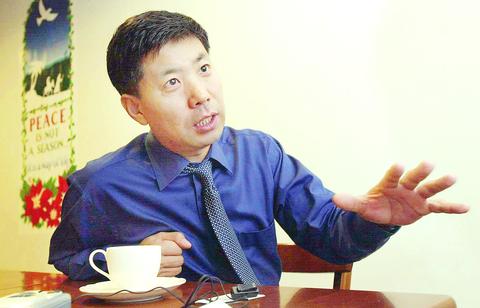
PHOTO: CHIANG YING-YING
Today, the government is still under control of a small group of conservatives who show no tolerance of dissenting voices.
Direct elections on the town and village levels border on a sham. Almost all candidates are handpicked by the Chinese Communist Party, which can, and often does, nullify the election outcome when its favored runners lose the race.
Democracy is more than adoption of certain political institutions. It is a way of life, the reflection of one's attitudes and values. Culturally, it may take Chinese people hundreds of years to truly assimilate Western philosophies, even in the absence of suppression. But that's no excuse for the Chinese authorities not to practice democracy, at odds with the global trend.
TT: Years after embarking on modernization, China now boasts an improved human rights record. To your knowledge, is that claim merited?
Zhang: Not in the least. In the past, China viewed human rights protection as a purely domestic matter, and any criticism from other countries is considered an improper intrusion. Now, Beijing is willing to discuss the issue with the international community, which I acknowledge is a sign of improvement.
The change, however, is cosmetic in that the Chinese government shows no relenting in its oppression to liberal intellectuals and religious groups. That explains why Falun Gong, Tibet and civil liberties remain taboos. Based on my personal experience, intellectuals enjoyed more freedom when Hu Yaobang (
TT: What do you think is the biggest obstacle to democratic reform in China?
Zhang: I concede that lack of organization and strategy caused the 1989 student movement to grow out of control later. Without a party-like apparatus, the protesters did not know when to retreat after successfully putting pressure on the government. The DPP in Taiwan did not experience a similar plight when staging street protests in the early 1990s.
The stark contrast bespoke the students' passion and naivety, but more importantly, it highlighted the importance of an opposition party. In light of the Chinese Communist Party's tight grip on power, I don't think China is anywhere ready to witness a power transfer in the foreseeable future such as Taiwan did in May last year -- peacefully.
Unlike most others, I'm not pessimistic, though. More and more Chinese students are studying abroad. I believe that after they graduate, they will help put the country in the right course, formidable as the mission may be.
TT: We haven't seen any massive student protest in China after the Tiananmen tragedy 12 years ago. How do you account for the calm?
Zhang: The bloody crackdown on June 4, 1989, has had a chilling effect on democracy fighters in China. I prophesied back then the massacre would bring about quiet for at least 20 years.
Also, students and intellectuals today tend to care less about the country's future. Over the years, Beijing has learned to play softball -- luring the intelligentsia with offers of material wealth and government posts -- to divert their energy. Many have succumbed to the temptation and muted their criticism of the regime. Some of my acquaintances, for instance, lead upper-class lives, no longer mindful of the pro-democracy crusade. I guess that is part of the price for embracing capitalism.
TT: How do you respond to allegations that students in the Tiananmen demonstration were pawns of a power struggle among the top brass in government?
Zhang: The student protest was spontaneous. As a frontline participant, I know that for sure. Certainly some politicians sought to use the movement to advance their own careers. Zhao, then China's president, intended to pressure more conservative elements within the party into liberal reforms. Former premier Li Peng (李鵬), on the other hand, seized on the turmoil to thwart Zhao's agenda. As Zhao was sympathetic with the students, we threw our weight behind him. We didn't mind being used in that manner. Unfortunately, the hardliners got the upper hand and Zhao was purged and put under house arrest. By failing to react positively to the student protests, China missed a great opportunity for political reform.
TT: Have you tried to return to China?
Zhang: Many times. But the Chinese authorities refuse to grant me a visa. They would arrest me on the spot if I were to set foot in the country. More than 200 people, up from 20, are on the so-called blacklist, including Gao Zhan (高瞻), the Chinese American scholar who has been detained since her trip back to China [in February]. Her arrest, which also enraged the White House, is linked to her former trips to Taiwan. Beijing tends to label anyone who visits Taiwan as a spy. That testifies to how far China has gone in improving its human rights record.
TT: Brought up with Chinese communist teaching that Taiwan is part of China and later studying cross-strait relations in the US, how do you view the standoff between Taipei and Beijing?
Zhang: It is a delicate issue that takes leaders on both sides great wisdom to handle. I would suggest an approach featuring more tolerance and less ideology. So be it if the people of Taiwan prefer the status quo. Let time have its way.
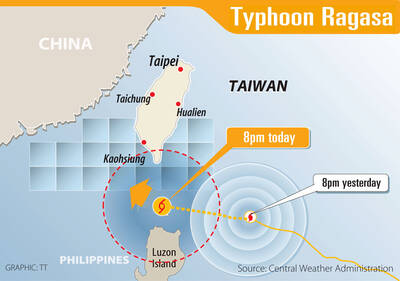
WARNING: People in coastal areas need to beware of heavy swells and strong winds, and those in mountainous areas should brace for heavy rain, the CWA said The Central Weather Administration (CWA) yesterday issued sea and land warnings for Typhoon Ragasa, forecasting that it would continue to intensify and affect the nation the most today and tomorrow. People in Hualien and Taitung counties, and mountainous areas in Yilan and Pingtung counties, should brace for damage caused by extremely heavy rain brought by the typhoon’s outer rim, as it was upgraded to a super typhoon yesterday morning, the CWA said. As of 5:30pm yesterday, the storm’s center was about 630km southeast of Oluanpi (鵝鑾鼻), Taiwan’s southernmost tip, moving northwest at 21kph, and its maximum wind speed had reached
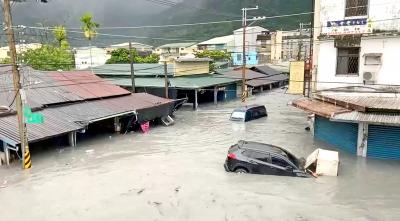
MATAIAN RIVER: Rescue operations were ongoing, with officials urging residents to move to higher floors where possible as teams focus first on those at ground level Floodwaters from the overflowing Mataian River (馬太鞍溪) barrier lake swept into Hualien County’s Guangfu Township (光復) yesterday afternoon, leaving hundreds of people trapped and three missing as of press time last night, the Hualien County Fire Bureau said. The waters surged into downtown Guangfu after the riverbank burst at about 2:50pm, carrying mud and debris and submerging streets to rooftop level in some areas. Residents were seen climbing onto vehicles and rooftops to await rescue as thick, silt-laden water inundated the town. The surge destroyed the Mataian Bridge (馬太鞍溪橋) and flooded the Guangfu Railway Station. Rescue operations were launched with support from fire departments
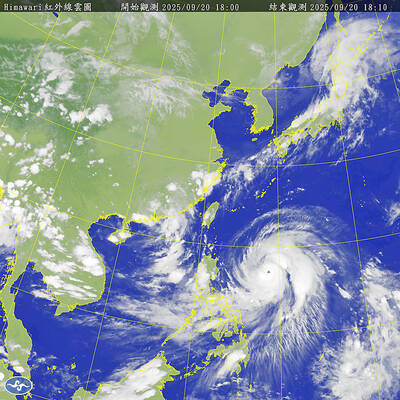
The Central Weather Administration (CWA) yesterday said that it expected to issue a sea warning for Typhoon Ragasa this morning and a land warning at night as it approached Taiwan. Ragasa intensified from a tropical storm into a typhoon at 8am yesterday, the CWA said, adding that at 2pm, it was about 1,110km east-southeast of Oluanpi (鵝鑾鼻), Taiwan’s southernmost tip. The typhoon was moving northwest at 13kph, with sustained winds of up to 119kph and gusts reaching 155kph, the CWA Web site showed. Forecaster Liu Pei-teng (劉沛滕) said that Ragasa was projected to strengthen as it neared the Bashi Channel, with its 200km
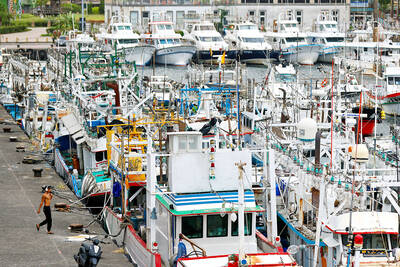
PUBLIC ANNOUNCEMENTS: Hualien and Taitung counties declared today a typhoon day, while schools and offices in parts of Kaohsiung and Pingtung counties are also to close Typhoon Ragasa was forecast to hit its peak strength and come closest to Taiwan from yesterday afternoon through today, the Central Weather Administration (CWA) said. Taiwan proper could be out of the typhoon’s radius by midday and the sea warning might be lifted tonight, it added. CWA senior weather specialist Wu Wan-hua (伍婉華) said that Ragasa’s radius had reached the Hengchun Peninsula by 11am yesterday and was expected to hit Taitung County and Kaohsiung by yesterday evening. Ragasa was forecast to move to Taiwan’s southern offshore areas last night and to its southwestern offshore areas early today, she added. As of 8pm last night,